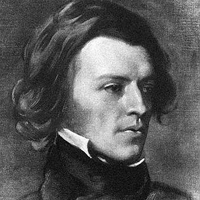Victorian Consciousness in Tennyson's The Lotos Eaters
The Lotos-Eaters, which describes a scene from the Odyssey (c. 800 b.c.e.) in which Odysseus and his men, after a terrible storm, arrive on the shores of the land of the lotos-eaters, is a poem typical of the Victorian age. It typifies Victorian consciousness.

Alfred L. Tennyson (1809-1892)
Odysseus' men are returning home to Ithaca after participating in the sack of Troy. It is known from Homer that in the end Odysseus actually will reach Ithaca and the others will die in the course of various adventures on the sea. Their difficult journey, however, almost ends on this island, because of the drugging effect of the lotos plant, a staple of the inhabitants.
Odysseus' sailors, returning home after the fall of Troy, are forced to land in a strange country after a strong wind propels them past the island of Cythera. The inhabitants, "the mild-eyed melancholy Lotos-eaters," are sustained solely on the fruit of the lotus plant. The sailors eat the fruit and become lethargic and listless, losing all desire to continue their journey.
The poem poses an alternative to the never-ending struggle for achievement in the modem world, at the same time questioning the merit of the behaviour. Lines from this well-known poem include: "Death is the end of life; ah, why/ Should life all labor be?" and "In the hollow Lotos land to live and lie reclined/ On the hills like Gods together, careless of mankind."
The last lines summarize the poem, which turns out to have been one long argument against industry. The sailors imagine they are gods looking down on the life of humans. The Greek view of death does not give meaning to life; thus, one's actions, whether heroic or not, do not count in the long run. The sailors conclude by saying they will not return to the sea.
While this poem seems a-historical, in fact, it represents Tennyson's gradual disenchantment with "progress" as a celebrated Victorian value. The poem was published in the year of the First Reform Bill, 1832, which extended voting rights to approximately fifty percent more men in England and Wales than had been able to vote before. While this was hardly dramatic (five of six men still lacked the vote) this bill set the stage for subsequent reform bills to come; effectively, from the perspective of upper class Britons, it opened the floodgates of democracy to the vast, uneducated and largely illiterate 'masses.'
When Tennyson's poem was revised and republished ten years later, he added a passage of explicit language suggesting his awareness of the kind of suffering that sent men and women into the streets during what were called the Chartist riots, the first sustained, inclusive working-class movement in modem English history. Corn Laws that had controlled the supply and price of grain with tariffs had driven up the price of bread so that the poor were unable to buy this staple of their diet. There were no Laws to protect the millions of factory workers, who streamed to industrializing cities in England, and a previous generation of poets had heard William Blake lament the shameful conditions of women and children in that labor force. Starvation and disease were rampant. Horse drawn coaches would soon give way to the Iron Horse, the railroad, and the speed of time would be felt to increase with humans' markedly increased ability to speed through space. A poem that celebrated an ultimate place of lethargic rest and forgetfulness, whose voices abandoned responsibility for family and country, and abandoned forever striving to attain an unknown future, would have been a tantalizing way to start a conversation about the values of "progress" that Tennyson saw his contemporaries committing to.
As individuals, and in the context of their class and gender, Victorians were people struggling to adjust to change. Rapid urbanization led to crowded and unsanitary living conditions, exploitation of men, women and children in the labor force and to trafficking in women and children for purposes of both sex and work. Some parents who were too poor to support all of their children sold those who could be represented as able bodied workers into virtual bondage to unscrupulous representatives of various manufacturing and service industries. Other children, like the novelist Charles Dickens as a young man, worked off their fathers' debts while they languished in debtor's prisons. The growth of England as an empire opened markets for raw materials and manufactured goods, and the pressure to compete in the developing European world was intense. New forms of available capital destabilized traditional social stratifications; landed money interests were gradually being forced to share some of their power with a growing middle class that made its money in "trade" rather than through inheritance. The misery of the working poor stood in sharp counterpoint to a new group of men who had purchasing power earned through their skills as hat, glove, shoe and suit makers, as carpenters who made coffins and office furniture, as bankers and copyists, as apothecaries, as factory managers and commodities brokers and brewers. Faced with the rapid speed of change that would obviously only escalate as the century itself progressed, some celebrated and others experienced both physical and psychological anxiety and exhaustion.
Tennyson's poem reflects one dimension of the longing for escape and rest through its classical reference to the temptations of the land of the Lotos eaters in Homer's Odyssey.
Cite this Page!
Shrestha, Roma. "Victorian Consciousness in Tennyson's The Lotos Eaters." BachelorandMaster, 13 Sept. 2014, bachelorandmaster.com/britishandamericanpoetry/victorian-consciousness-in-the-lotos-eaters.html.
Related Topics
Break, Break, Break: Literary Analysis
Break Break Break: Critical Analysis
The Lotos Eaters: Critical Analysis
Lady Clare: Summary and Analysis
Elegy- Definition of Literary Term
Lyric- Definition of Literary Term
Salient Features of Victorian Literature
Biography of Alfred Lord Tennyson
 |
bachelorandmaster.com |